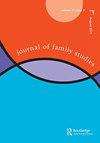Physical custody arrangements and fathers’ post-separation well-being
IF 1.6
4区 社会学
Q3 FAMILY STUDIES
引用次数: 3
Abstract
ABSTRACT Joint physical custody (JPC) is an emerging post-separation care arrangement in which children spend considerable periods of time with both of their parents. Although there is some research on JPC that has focused on children’s well-being, little is known about how this physical custody arrangement affects fathers’ well-being. Therefore, this study investigated the well-being of fathers with symmetric JPC and of non-resident fathers whose children live either mostly or exclusively with their mother. The statistical analysis draws on longitudinal data from waves 4–12 of the German Family Panel (pairfam). Random- and fixed-effects regression models were estimated for 1,372 observations of 389 fathers. The results of the bivariate random-effects models showed that fathers with symmetric JPC reported higher life satisfaction than other fathers. However, the fixed-effects model indicated that these differences were due to positive selection into symmetric JPC. Moreover, the results of the multivariate random- and fixed-effects models showed no statistically significant relationship between physical custody arrangements and fathers’ stress, depressiveness, life satisfaction, and general health. Taken together, this study suggests that physical custody arrangements are unrelated to fathers’ post-separation well-being while hinting at the relevance of selection processes among post-separation families.身体监护安排和父亲分离后的幸福感
摘要:共同物理监护(JPC)是一种新兴的分离后护理安排,在这种安排中,孩子们要花相当长的时间与父母双方在一起。尽管JPC的一些研究关注的是儿童的幸福感,但人们对这种身体监护安排如何影响父亲的幸福感知之甚少。因此,本研究调查了对称JPC的父亲和子女主要或完全与母亲生活在一起的非居民父亲的幸福感。统计分析采用了德国家庭小组(pairfam)第4-12波的纵向数据。对389名父亲的1372次观察结果估计了随机和固定效应回归模型。双变量随机效应模型的结果表明,具有对称JPC的父亲比其他父亲的生活满意度更高。然而,固定效应模型表明,这些差异是由于对对称JPC的积极选择造成的。此外,多变量随机效应和固定效应模型的结果显示,物理监护安排与父亲的压力、抑郁、生活满意度和总体健康之间没有统计学上的显著关系。总之,这项研究表明,实际监护安排与父亲分离后的幸福感无关,同时暗示了分离后家庭选择过程的相关性。
本文章由计算机程序翻译,如有差异,请以英文原文为准。
求助全文
约1分钟内获得全文
求助全文
来源期刊

Journal of Family Studies
FAMILY STUDIES-
CiteScore
3.20
自引率
12.50%
发文量
52
期刊介绍:
The Journal of Family Studies is a peer reviewed international journal under the Editorship of Adjunct Professor Lawrie Moloney, School of Public Health, LaTrobe University; Australian Institute of Family Studies; and co-director of Children in Focus. The focus of the Journal of Family Studies is on the wellbeing of children in families in the process of change.
 求助内容:
求助内容: 应助结果提醒方式:
应助结果提醒方式:


